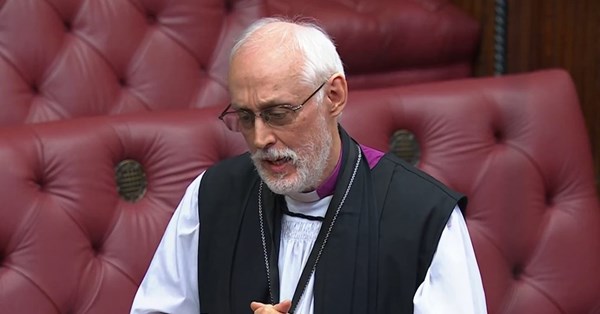CAREFUL consideration should be given to whether abolishing the seal of the confessional might lead to the reporting of fewer abuse cases, the Bishop of Manchester, Dr David Walker, told the House of Lords on Tuesday, during a discussion of proposals to introduce mandatory reporting for child sexual abuse.
In a statement to the Church Times on Friday, he made clear that he had offered no personal position on the issue, but said: “We cannot simply assume that abolishing the seal of the confessional will lead to more rather than fewer cases being reported.
“I remain ready to support whatever will be the best for protecting children, and hope that debate on the forthcoming Bill in Parliament will enable us to achieve that end.”
On Tuesday, Dr Walker told peers that there was an “arguable case” that the seal of the confessional allowed people who had been abused “to make a kind of protected disclosure, which then often would lead to them being helped to make a more public disclosure and allow a perpetrator to be taken to justice”.
The seal is the priest’s obligation under canon law to hear a person’s confession in complete confidence. It means that nothing that the priest is told in that context will be repeated or disclosed under any circumstances.
Dr Walker said that he hoped that there would be “careful discussions with religious bodies as to exactly where the seal of the confessional will fit in with this. . . I know my Catholic colleagues will particularly be concerned around that.”
Lord Hanson of Flint, responding on behalf of the Government, said that he had received representation from churches on the issue.
“I have given a commitment to discuss that further with those from the churches who made contact with me,” Lord Flint said, and expressed hope that this would be further debated as the Crime and Policing Bill went through Parliament.
In 2022, the Independent Inquiry into Child Sexual Abuse (IICSA) advised that mandatory reporting of child sexual abuse should be enshrined in UK law. In January this year, the Home Secretary, Yvette Cooper, pledged to fulfil this recommendation (News, 7 January).
Later that month, the Bishop of London, the Rt Revd Sarah Mullally, told the House of Lords that the safeguarding “reset” in the Church of England must have mandatory reporting “at its heart”.
She was speaking in a debate on a Private Member’s Bill that would require the providers of certain activities, including religious organisations, to report knowledge or suspicions of abuse to the local authority (News, 24 January).
In February, the General Synod approved an updated safeguarding code of practice that includes an injunction that a disclosure “must be referred to the police or social services and the relevant PSO [parish safeguarding officer] or Safeguarding Officer within one working day” (General Synod Digest, 28 February).
ON FRIDAY, Dr Walker said that part of the function of bishops in the House of Lords was to be a “voice for faith in Parliament”.
Traditionalist clergy in the Church of England have previously asked that mandatory reporting of child abuse not be applied to statements made during confession (News, 16 August 2023).
Safeguarding guidelines on the website of the Catholic Bishops’ Conference of England and Wales state that “if you are in any role within the Catholic Church in England and Wales, you must refer allegations directly to the safeguarding office for your diocese or religious congregation, or directly to the Police”.
The lead RC bishop for safeguarding, the Rt Revd Paul Mason, who is a board member of the Catholic Safeguarding Standards Agency (CSSA), said in 2022 that compromising the seal of the confessional might remove an opportunity to encourage an abuser to go to the police.
“If we were to have mandatory reporting, we would have no access at all to someone who would enter a confessional box to confess such a sin. At the moment, we have such an opportunity,” he said.
The priest existed in the sacrament of the confession solely as a conduit to God, he said. “We simply couldn’t turn a priest from a minister of God into an agent of the state.”
The final report of IICSA also called for a national redress scheme for victims of child sexual abuse, but Lord Flint said on Tuesday that the Government was “not yet able to commit” itself to such a scheme, referring to an forthcoming spending review.
Dr Walker spoke about the redress scheme set up by the Church of England, and suggested that it was important that bodies that “did wrong” — either “in the original abuse, colluding with a cover-up, or failing to take a disclosure seriously” — should bear the costs.
It was announced this week that Dr Walker would succeed the Bishop of St Albans, Dr Alan Smith, as convener of the Lords Spiritual.
He said that he hoped to continue Dr Smith’s work in “encouraging and mentoring new arrivals” to the Lords, “as well as being a voice for us among the different parties and groupings” in the House of Lords.
“There are many challenges facing us as a country, and I believe that bishops have a vital role to play in working for the common good, as well as fulfilling our spiritual and constitutional role in Parliament,” he said.
Dr Smith has been convener since 2022, but will step down on his retirement at the end of May (News, 8 January).
Church of England bishops defended their position in the House of Lords last month, after amendments were tabled to the Government’s House of Lords (Hereditary Peers) Bill to remove their right to 26 seats (News, 19 March).
Baroness Smith, on behalf of the Government, said: “We welcome the presence of the Bishops here. . . There is a place in the House for the Bishops at the moment.”














